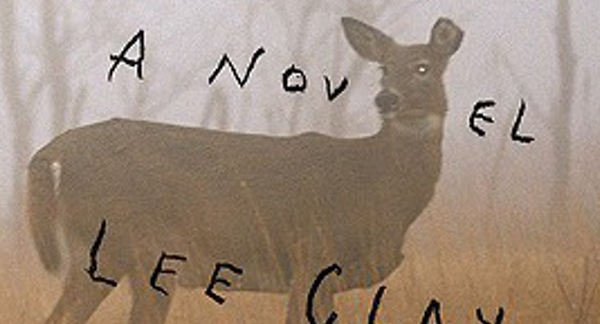Interviews
Rivka Galchen & David Gordon Discuss Children, Japanese Culture and Writing as a Conversation with…
R

I met Rivka Galchen on the first day of Jaime Manrique’s writing workshop. I realized she had extended the sleeves of a too-short sweatshirt by sewing the cuffs from a men’s dress shirt into them and decided I had to make friends with someone that cool. Since then she has published the novel Atmospheric Disturbances, the story collection American Innovations, and numerous articles in the The New Yorker, Harpers and elsewhere. Her new book, Little Labors, is out from New Directions today.
David Gordon: The title is of course a clever play on the labor of giving birth to a little one, as well as the offering of small works: but it also reminds me of Adorno’s Minima Moralia, which itself has a double-meaning: Little Fables and, one might say, Minimal Morals. How much if any of this did you intend? And how does that work relate to yours?
Rivka Galchen: This was definitely the least ‘intentional’ work I have ever written, it literally evaded my original intention, of writing a straightforward essay about The Tale of Genji and The Pillow Book. Michael Barron who was at New Directions then had invited me to try to do something for their Pearl series and that was my idea. I don’t know why I thought the right title for that book, which wasn’t going to have much of anything about babies in it, was “Little Labors.” I mean, I do know, I thought I was very attached to the description of women’s writing in Japan in that time period being described as work written in the ‘little hand’ or ‘the woman’s hand’ which is to say, in Japanese, rather than in the language of power at the time, Chinese. That said, if my normal conscious controlling self is the power, then the book ended up being a series of tiny resistances. And I of course owe the presence of those Little Fables to you! I first read Minima Moralia with you, and I think part of our early friendship grew out of finding we underlined the same things, and laughed at the same bits.
DG: Yes! I especially remember us both loving his description of children playing, which I took as a kind of secret epigram to this book: “Unconsciously they rehearse the right life.” You just mentioned The Pillow Book and Tales of Genji — which are discussed at length in Little Labors, but really the Japanese connection seems to run everywhere though this text, from the 47 Ronin to the mean neighbor who just happens to be Japanese. Can you talk about your love of those books, and Japanese culture generally?
RG: There’s something embarrassing (and ethically troubling) about being enamored of another culture, all the more so in this case given that I don’t even speak Japanese. But, I don’t know! I used to love the stamps from Japan that would come in the mail to my father, a scientist. Also we had a few items in the house, presents from Japanese students, and these scrolls and bowls were so magic-drenched for me. And then, when I was in elementary school, they were building a Subaru factory near my hometown of Norman, Oklahoma and we did a special study section in school, on Japanese culture, the idea being — I’m guessing here — that we children could then better welcome the young Japanese immigrants we expected would come over with their Subaru executive parents. We learned about seaweed, origami, maybe other more straightforwardly substantive things as well… but the kids never came! Anyhow, I see now that I haven’t talked about the books yet….
DG: Do you imagine your daughter someday reading this book? Was it in any way addressed to her?
RG: She’s such a different animal now then she was then. The book was written while she was still the size of a human that is at once more predictable than bigger humans, but still more mysterious and alien. So, I think the book was maybe addressed to her, or had a future her in mind, but not because it would be able to tell her something specific, more like…a collection of leaves gathered in the year of her birth and pressed into a book? Not that I ever press leaves or flowers in books, but I remember that when I was a kid and would find pressed flowers in the books at friends’ houses, they seemed so telling! But telling of what, I don’t know.
DG: It seems to me you wrote this book in something like real time, reflecting on these early months of your child’s life while living them. Can you talk about that process?
RG: Many of the bits in the book are, literally, only slightly tidied up from small notes I made to myself in the first year of her life. I didn’t actually get the notes all assembled together and turn them in to New Directions as if they were a book until nearly a year later, but that was the process, which is definitely not my normal ‘process.’
DG: I wish the term “voice” didn’t have such an over-determined literary meaning, because I want to say how much this book “sounds” like you. Of course, all your work carries your voice, like your DNA, but I find that, unfiltered through a character or even the objective pose of the reporter, this feels remarkably like just talking to you. Did you feel that writing?
RG: Usually I don’t mind forgetting large expanses of my experience, but when I saw a note to myself about how I was reading from the newspaper to Georgie, and I read the word ‘phenomenon’ and she then interrupted to say, “Mana mana?” (from the Muppets short that we have watched together so many times) — well I had forgotten that by the time I read the note. And that tiny note didn’t go into the book, of course, because it fell on the side of Notes Really Just Interesting To Me, but I tried to keep notes in a way that I never have in my life before, as someone with a strong aversion to keeping a journal. And so maybe that’s why it sounds more like conversation, in the way that conversation with a friend is so often like the reporting of the random relatively unconsidered thought that just crossed one’s mind, like trading and reacting to each other’s trailing thoughts, being happy chatting regardless of whether the thoughts fizzle or grow.
DG: Actually, until just recently, I did think the Muppets were saying ‘phenomenon!” But following on the notational process you described, this book does seem to have a unique, organic form of its own. How did you arrive at it?
RG: I originally turned in an almost no space-breaks long associative essay that resembled most, I would say, the cramped handwritten notes sent to planetariums and other sorts of authoritative institutions, notes you can tell the writer feels bear an important message, but that are basically unreadable, no message gets across. It was a crazy compost heap, according to not only myself. So then I let time pass. And then, one week I finally was like, I have this energy. I feel like I have the energy to do this and I think I know how to do it. And then the whole book came together, from accumulated notes, and even from the old compost heap, pretty quickly.
DG: You also describe the difficulty of working, and even thinking, with a newborn, frustrating for anyone, especially perhaps a writer, used to grown-up intellectual activity. But you also say that being stranded in the present actually lifted your habitual melancholy and re-enchanted the everyday. This feels very much like the texture of this book itself.
RG: I don’t think I’m alone in somehow deploying sadness as a way to be isolated and just wander around in my own thoughts, a somewhat useful way to get words on the page, but also a sort of unpleasant way to live. It also leads one to the depressive delusion — albeit also truth — that, How can I even take human life — let alone whatever thing I’m working on — seriously, it all being this blip in the cosmos? Then a baby: it’s just like every self-help book says, once you’re not thinking, once you’re mostly doing, you’re relieved of the anxiety and melancholy, which is just a habit of mind. Or, at least, partly just a habit. The clouds shift somewhat.
DG: You say it matters that both Pillow Book and Genji were written by women. Can you say a bit more about why? I think of the fact that Genji is sometimes considered the first novel, or at least the first “classic,” which makes me think of the history of the novel as a “female form,” considered light women’s reading through to Flaubert. I wonder how this fits with the more recent view that it is a patriarchal or male-gazey form?
RG: I like what you said! I do think the novel, most often, is about what can be done with “lightness” and “smallness” and “diversion.” A lot can be done with those things, it turns out. And in terms of the novel being a female versus male form… obviously it’s shape-shift-y enough to accommodate any description of it, but I do think there’s something to what you once observed to me, about how cooking and making clothing were refined art forms always, or could be, and then it was just necessary, historically, for a man to become interested in those arts for them to begin to gain recognition as, well, arts? That said, part of the power of the novel is, I think, that it can move from gaze to gaze, with so much nuance that it always has more than its own voice’s perspective. Ideally, anyhow.
DG: You also have a very illuminating section on “women writers.” I love your story about thinking Denis Johnson was a woman — my version of that was Evelyn Waugh. To me, the very term “women writers” is suspect. If you need to clear up the gender of Denis or Evelyn, you say they are “male writers,” making “female writer,” the proper descriptive. So what does “women writers” mean to you? Did a certain definition of “femininity” make your instinctive alliance with male writers a kind of rebellion, and as such a paradoxically feminist move?
RG: Again, I like your read on it! I don’t know. In some imaginary ideal world, there would seem to be as much difference between one male writer and another, one female writer and another, that the gender of the writer would just be one, occasionally illuminating but not always illuminating, way of categorizing a work. And like you suggest, I don’t think it’s difficult to imagine that a young woman — me, I guess — might instinctively try to keep a distance from what has been categorized as feminine, Even as keeping a distance is just as flawed a strategy for being feminine as following the presented path for being feminine. That’s a slightly different issue from reading, from what we read, but they get easily tangled when you’re just a young person stumbling in search of finding out what all this stuff is that we’re told is great and which often is great.
DG: You pass into some dark territory when you note that having a child means that death or suicide is (theoretically) no longer an option: one is sentenced to life as a parent. I wonder if you could speak more about writing about motherhood, a subject that might resist the ambiguity that serious writing requires.
RG: Well, in that funny way, I felt like there was something intellectually compromised about not being totally bored by motherhood. In my tiny demographic, I felt like the socially acceptable story about mothering is that it is, you know great, but also dehumanizing, anti-intellectual and boring. I see how there’s truth in that perspective, but it really wasn’t quite like that for me. Definitely not boring.
DG: I loved the Barthesian un-tangling and re-tangling of “taste culture.” In the Orange section you both resist the idea of being part of a social “class,” while also admitting the advantages (at least in theory) of having your child be a member. But your next move is to brilliantly decode it, to find its link to Gitmo and prisons, fulfilling Benjamin’s Law: No document of culture that is not also a document of barbarism. However, equally interesting to me is the section “When the Empress Moved.” Here, unless I’m mistaken, Shonagon’s exquisite taste is a kind of brilliantly strategic move, the only one she had: and you conclude, “Taste culture always helplessly tells another story.” Hence “taste,” and by association style, even writing, become a way of resisting and subverting the dominant historical narrative. Or am I just imposing my own views and tastes?
RG: In Edith Wharton’s House of Mirth, there’s a way in which we can’t help but admire how Lily Bart just can’t bear to trade in her cultural and sexual capital for a safe, secure marriage to a wealthy man. She just keeps turning down the situations — unpalatable — that can literally save her life. Eventually, through a chance inheritance, she pays off her debt, but then takes an overdose of sleeping pills. She ends poorly in every sense. But the strange thing in that book is that there’s some sense of Wharton’s exasperation with Lily Bart, as if she deserved it, simply because she could have chosen otherwise. And we feel that twinge, too. Lily does get what could be expected, though it would be wrong to say that she gets what she deserved. Anyway, that’s a long roundabout on taste culture, and women, and its power, which we can see deployed well, and urgently, even as it carries, always, the trace of evil? That said, I can’t help it, I will always respond in my heart with a kind of joy to a room painted white all over, with an old-fashioned set of plates, and one bit of color somewhere, maybe in a soda bottle. And we all know what that means.
DG: Speaking of Japan, children and artistic brilliance, we are both big fans of the great animator Hayao Miyazaki. I understand your daughter has been watching his movies. What does she think?
RG: Among the things Georgie loved in My Neighbor Totoro was the way you could see the bits of cucumber in Mei’s mouth as she chews. Also she was curious about where the door on the cat bus was.
DG: Good point! I never thought about that.









